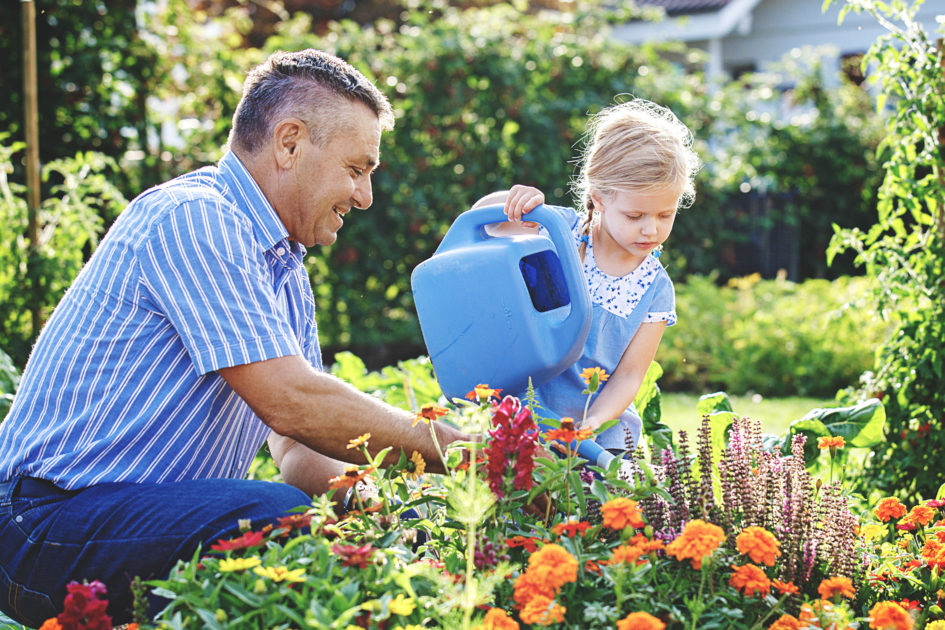There are many advantages to gardening in addition to having beautiful flowers to enjoy. The health benefits of gardening are so well-established that horticulture therapy is now used to address a host of mental and physical ailments, including anxiety, dementia, eating disorders and post-surgery recovery.
The bountiful benefits include:
Physical Perks
The CDC considers gardening aerobic exercise. Hauling full wheelbarrows, digging, planting, weeding and other tasks required are all forms of physical activity, and active people are less likely to be obese or experience high blood pressure, type 2 diabetes, heart disease, stroke, premature death and other serious medical conditions.
Emotional Benefits
Digging in the dirt is not only fun, it can boost your mood. Dirt contains mycobacterium vaccae – a natural antidepressant. Some scientists speculate that since we’re no longer in contact with common bacteria found in dirt, this has thrown our immune systems out of whack, causing inflammation that plays a role in many modern illnesses. It’s beneficial to reintroduce these friendly bacteria into our lives.
The act of gardening can also stimulate insights, prompt an awareness of one’s surroundings and enhance mental clarity. Gardening decreases physical manifestations of tension by reducing the stress hormone cortisol. A study published in the Journal of Health Psychology found allotment gardeners had lower cortisol levels following a stressful task than those who read for leisure. Another study of older adults found gardening contributed to lower self-reported stress levels than those who participated in indoor exercise classes. Not only can gardening tasks usher in benefits, the rewards of harvest can induce pride, confidence and a sense of accomplishment.
Vitamin D
Gardening gets you out in the sun, and sunlight sparks a chemical process in your body that produces vitamin D. Low vitamin D levels are associated with poor bone health and other serious conditions. While excess sunlight can lead to skin cancers, a moderate amount can have preventive benefits against other cancers.
To reap the benefits of vitamin D, you need to get about five to 15 minutes of sunlight (sans sunscreen) two to three times a week if you’re fair-skinned. If you have dark skin, you have more natural protection and need to spend three to five times longer in the sun than a person with light skin, to produce the same amount of vitamin D. The sun’s rays cannot penetrate your skin if you’re wearing sunscreen. Once you’ve gotten your 15 minutes of sun, you can put on sunscreen, a hat and protective clothing.
Quality Produce
Gardening can help you eat healthier. According to research, gardeners tend to eat more fruits and veggies than their peers. Home gardens are typically filled with organic produce that are free of harmful chemicals. Homegrown produce often taste better and are fresher than store-bought varieties. Plus, homegrown goods are a wise financial investment. Gardens tend to increase home values and save money on grocery shopping.
Family Bonding
Everyone from aging parents to young children can get involved for multigenerational quality time and connection. Caring for plants can teach young children about responsibility, science, nature and where food comes from. Studies of after-school gardening programs have shown that kids who garden are more likely to eat fruits and veggies and are more adventurous about trying new foods.
Community Gardens
If you don’t have room at home to garden, see if community garden plots are available. Participation can foster a sense of community pride and ownership, and provide a great way to meet people of different backgrounds. Community gardens beautify neighborhoods, reduce air pollution and filter rainwater, which helps keep lakes, rivers and groundwater clean. They have also been shown to decrease crime in neighborhoods and increase property values. Growing food locally reduces one’s carbon footprint since produce usually travels great distances before reaching store shelves.
Here are tips for encouraging gardening among your workforce:
- Send a companywide email outlining the benefits of gardening and tips for getting started, or host a Lunch ‘n’ Learn on the topic. You can reach out to a local garden club to find a speaker for the event.
- If your company’s office is situated on a large lot, designate some land for community gardening plots employees can use. Another option is to sponsor an existing community garden.
- Surprise your employees with free seeds this spring to encourage them to give gardening a try. A packet of seeds is often less than a dollar. Herbs are a good choice since they can add vibrant flavors to meals.
- Provide gift cards to a home store that sells gardening supplies as an incentive for your next wellness challenge.
Planting a garden is good for all your senses – flowering varieties are enjoyable to look at, fragrant varieties can fill your yard with aromatic smells, and fruits and vegetables satisfy your taste buds. In our busy culture that makes so many demands on our focus, take time to get lost in gardening. If you’re not ready to commit to a time-intensive garden, start by potting herbs indoors or creating a container garden to spruce up your outdoor space.
www.msue.anr.msu.edu/news/what_are_the_physical_and_mental_benefits_of_gardening
www.healthline.com/desktop-article/food-nutrition/benefits-vitamin-d
www.ncbi.nlm.nih.gov/pubmed/20522508
https://orca-mwe.cf.ac.uk/53264/1/HortTechnology%20Paper%20-%20JHawkins%20et%20al.%202011.pdf

